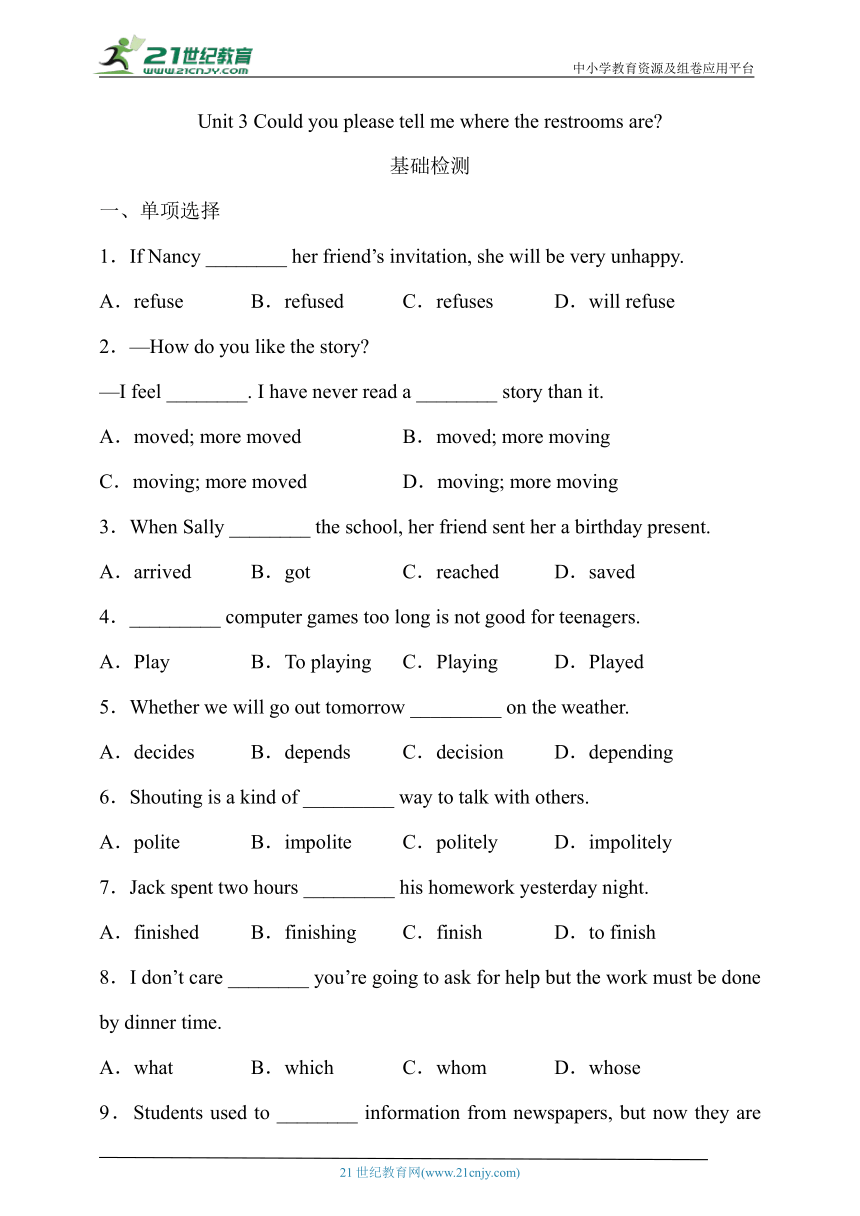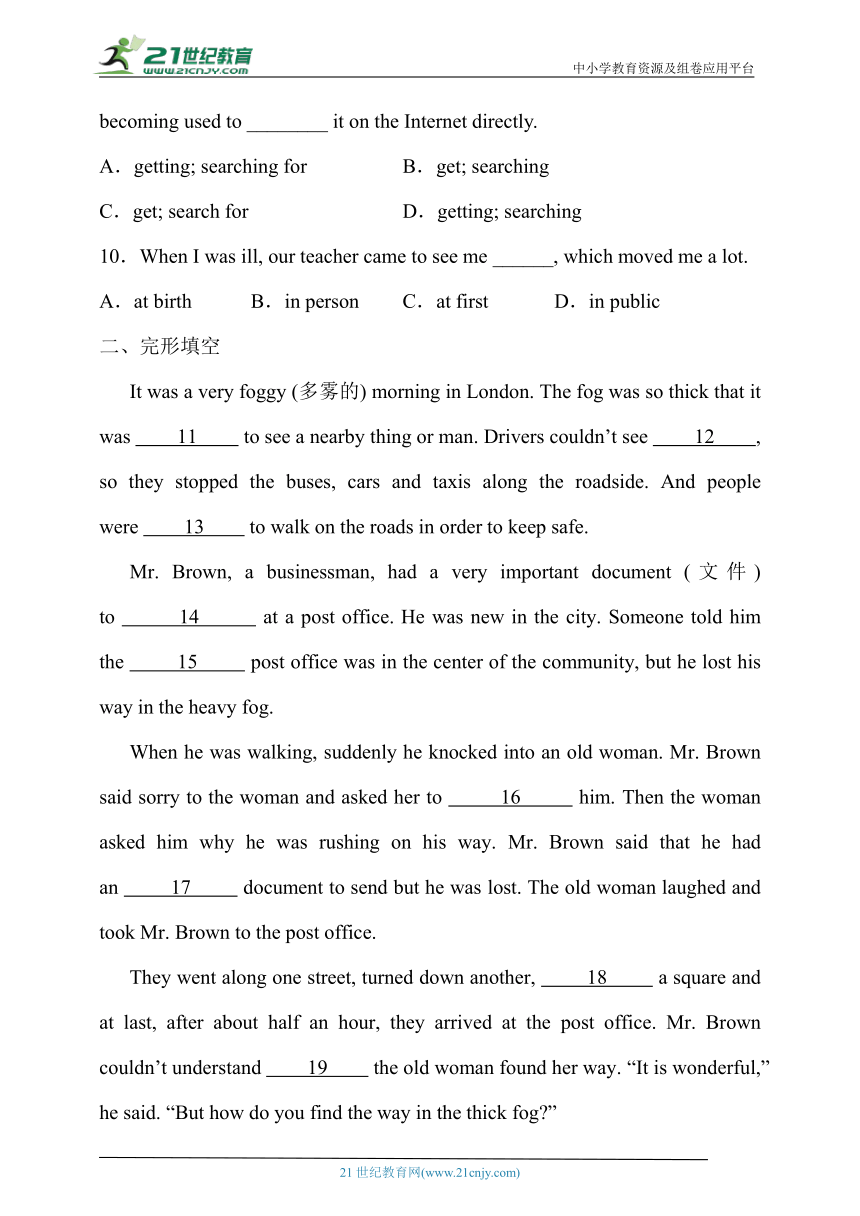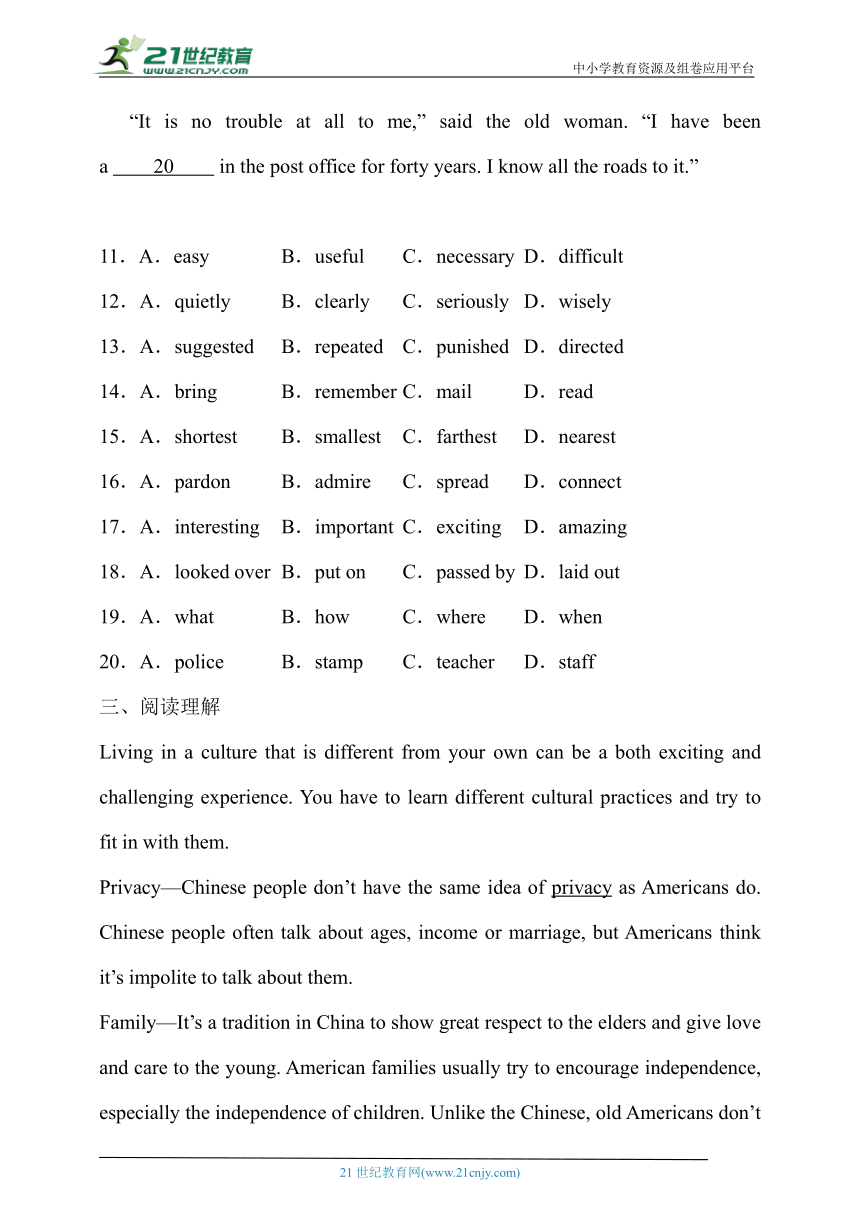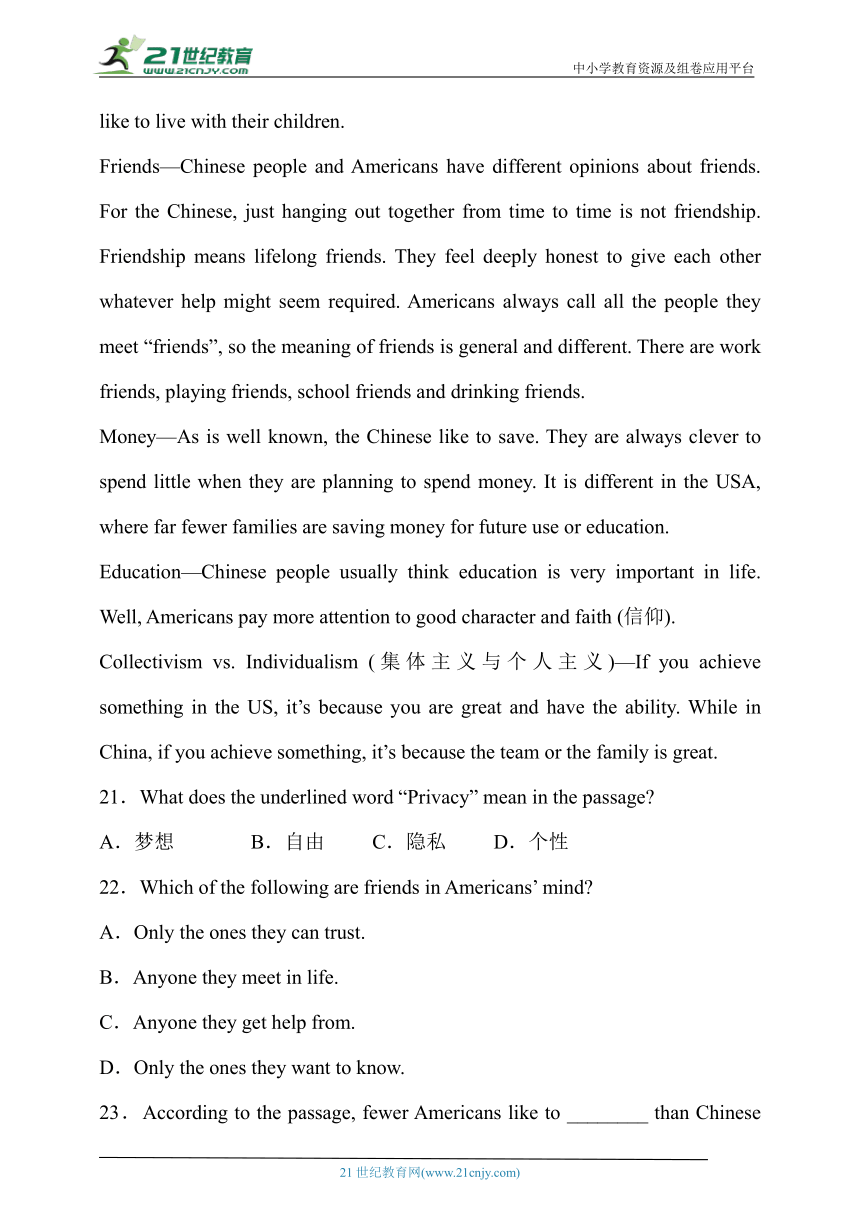Unit 3 Could you please tell me where the restrooms are?基础检测(含答案)2024-2025学年九年级英语上册2024年人教版
文档属性
| 名称 | Unit 3 Could you please tell me where the restrooms are?基础检测(含答案)2024-2025学年九年级英语上册2024年人教版 |

|
|
| 格式 | docx | ||
| 文件大小 | 46.8KB | ||
| 资源类型 | 试卷 | ||
| 版本资源 | 人教新目标(Go for it)版 | ||
| 科目 | 英语 | ||
| 更新时间 | 2024-09-26 15:39:08 | ||
图片预览




文档简介
中小学教育资源及组卷应用平台
Unit 3 Could you please tell me where the restrooms are
基础检测
一、单项选择
1.If Nancy ________ her friend’s invitation, she will be very unhappy.
A.refuse B.refused C.refuses D.will refuse
2.—How do you like the story
—I feel ________. I have never read a ________ story than it.
A.moved; more moved B.moved; more moving
C.moving; more moved D.moving; more moving
3.When Sally ________ the school, her friend sent her a birthday present.
A.arrived B.got C.reached D.saved
4._________ computer games too long is not good for teenagers.
A.Play B.To playing C.Playing D.Played
5.Whether we will go out tomorrow _________ on the weather.
A.decides B.depends C.decision D.depending
6.Shouting is a kind of _________ way to talk with others.
A.polite B.impolite C.politely D.impolitely
7.Jack spent two hours _________ his homework yesterday night.
A.finished B.finishing C.finish D.to finish
8.I don’t care ________ you’re going to ask for help but the work must be done by dinner time.
A.what B.which C.whom D.whose
9.Students used to ________ information from newspapers, but now they are becoming used to ________ it on the Internet directly.
A.getting; searching for B.get; searching
C.get; search for D.getting; searching
10.When I was ill, our teacher came to see me ______, which moved me a lot.
A.at birth B.in person C.at first D.in public
二、完形填空
It was a very foggy (多雾的) morning in London. The fog was so thick that it was 11 to see a nearby thing or man. Drivers couldn’t see 12 , so they stopped the buses, cars and taxis along the roadside. And people were 13 to walk on the roads in order to keep safe.
Mr. Brown, a businessman, had a very important document (文件) to 14 at a post office. He was new in the city. Someone told him the 15 post office was in the center of the community, but he lost his way in the heavy fog.
When he was walking, suddenly he knocked into an old woman. Mr. Brown said sorry to the woman and asked her to 16 him. Then the woman asked him why he was rushing on his way. Mr. Brown said that he had an 17 document to send but he was lost. The old woman laughed and took Mr. Brown to the post office.
They went along one street, turned down another, 18 a square and at last, after about half an hour, they arrived at the post office. Mr. Brown couldn’t understand 19 the old woman found her way. “It is wonderful,” he said. “But how do you find the way in the thick fog ”
“It is no trouble at all to me,” said the old woman. “I have been a 20 in the post office for forty years. I know all the roads to it.”
11.A.easy B.useful C.necessary D.difficult
12.A.quietly B.clearly C.seriously D.wisely
13.A.suggested B.repeated C.punished D.directed
14.A.bring B.remember C.mail D.read
15.A.shortest B.smallest C.farthest D.nearest
16.A.pardon B.admire C.spread D.connect
17.A.interesting B.important C.exciting D.amazing
18.A.looked over B.put on C.passed by D.laid out
19.A.what B.how C.where D.when
20.A.police B.stamp C.teacher D.staff
三、阅读理解
Living in a culture that is different from your own can be a both exciting and challenging experience. You have to learn different cultural practices and try to fit in with them.
Privacy—Chinese people don’t have the same idea of privacy as Americans do. Chinese people often talk about ages, income or marriage, but Americans think it’s impolite to talk about them.
Family—It’s a tradition in China to show great respect to the elders and give love and care to the young. American families usually try to encourage independence, especially the independence of children. Unlike the Chinese, old Americans don’t like to live with their children.
Friends—Chinese people and Americans have different opinions about friends. For the Chinese, just hanging out together from time to time is not friendship. Friendship means lifelong friends. They feel deeply honest to give each other whatever help might seem required. Americans always call all the people they meet “friends”, so the meaning of friends is general and different. There are work friends, playing friends, school friends and drinking friends.
Money—As is well known, the Chinese like to save. They are always clever to spend little when they are planning to spend money. It is different in the USA, where far fewer families are saving money for future use or education.
Education—Chinese people usually think education is very important in life. Well, Americans pay more attention to good character and faith (信仰).
Collectivism vs. Individualism (集体主义与个人主义)—If you achieve something in the US, it’s because you are great and have the ability. While in China, if you achieve something, it’s because the team or the family is great.
21.What does the underlined word “Privacy” mean in the passage
A.梦想 B.自由 C.隐私 D.个性
22.Which of the following are friends in Americans’ mind
A.Only the ones they can trust.
B.Anyone they meet in life.
C.Anyone they get help from.
D.Only the ones they want to know.
23.According to the passage, fewer Americans like to ________ than Chinese people.
A.save money B.spend money
C.make friends D.live alone
24.What’s more important in American education
A.Education and future. B.Good character and faith.
C.Habits of saving money. D.The true friendship.
25.What can we learn from the passage
A.Chinese people think children should be independent.
B.Old Americans prefer to live with their children.
C.Most Americans have the habit of talking about ages.
D.Americans pay attention to individual abilities.
Last year I went on holiday to southern Spain with my best friends, Jenny and Alice.
B
The Spanish people are very warm to visitors. Although I suggest you should know a few simple words in Spanish to communicate with local people, the Spanish people are willing (乐意的) to speak in English. When we arrived, we didn’t know where to find a hotel. I came to an old man and asked him for help politely. With his help, we got to a cheap but wonderful hotel, which even had a swimming pool. There we really enjoyed ourselves.
This year, Jenny is going to the UK with her parents, so it will be just Alice and me. Alice wants us to go on an adventure holiday in Africa. That means we have to go walking in the desert and sleep out in the open. She says it will be better than having a lazy holiday because we will learn about the world around us and see some wild animals. I’m not sure whether I want to go to Africa. For me, a holiday means relaxing on a beach not walking all the way. Alice says that we will see elephants and have some amazing experiences. I think she’s bored with lying in the sun all day. I have to make up my mind by next Monday so that she can buy plane tickets. It will cost 1,400 each to go to Africa but for two weeks in France, less than half that money will be enough.
26.Which word can best describe the old man
A.Funny. B.Serious. C.Kind. D.Shy.
27.Where is Jenny going this year
A.To France. B.To the UK. C.To Africa. D.To Spain.
28.Who is looking forward to an exciting holiday
A.Jenny. B.Alice. C.Jenny’s friend. D.Alice’s parents.
29.What will the writer do by next Monday
A.Make a travel plan. B.Tell her friend her decision.
C.Find some information about Africa. D.Buy plane tickets.
30.Which of the following is TRUE according to the text
A.Alice doesn’t like to see wild animals.
B.The Spanish people don’t like to speak in English.
C.The three girls had a good time in the cheap hotel.
D.The writer hopes for a cheap holiday.
C
Giving Directions in Different Places
If you ask people from different countries “Could you tell me the way to the post office ”, you will get different answers.
In Japan, people use landmarks(地标) instead of street names. For example, the Japanese will say to travelers, “Go straight down to the corner. 31. The post office is across from the bus stop.”
In Kansas, America, there are no towns or buildings within miles. So instead of landmarks, people will tell you directions and distance. For example, people will say, “Go north two miles. 32.”
People in Greece sometimes do not even try to give directions. They will often say, “Follow me.” 33.
Sometimes if a person doesn’t know the answer to your question, he or she, like a New Yorker, might say, “Sorry, I have no idea.” But in Yucatan, Mexico, no one answers “I don’t know”. 34. They usually give an answer, but often a wrong one. A visitor can often get lost in Yucatan!
35. You might not understand a person’s words, but maybe you can understand his or her body language. He or she will usually point to the correct direction. Go on in that direction and you may find the post office!
A.Turn east, and then go another mile.
B.But one thing will help you everywhere.
C.People there think “I don’t know” is not polite.
D.Turn left at the big hotel and go past a fruit market.
E.Because they don’t want to talk much with strangers.
F.Then he or she will take you through the streets of the city to the post office.
四、书面表达|
36.行为举止是否文明礼貌体现的不仅仅是个人形象和城市形象,也在一定程度上反映了社会的文明程度。为配合我市开展“创建文明城市(build a civilized city)”活动,学校号召同学们做一个文明的中学生,特举办以“How to Behave Well”为题的英文征文比赛。请根据以下要点提示,写一篇90词左右的短文。开头已经给出,不计入总词数。
要点:
1. 在学校我们应该怎么做;
2. 在校外我们应该怎么做;
3. 号召大家为此次活动共同努力。
How to Behave Well
To be a civilized student is very important for a student. Here are what we should do and shouldn’t do.
______________________________________________________________________________________________________________________________________________________________________________________________________________________________________________________________________________________________________________________________________________________________________________________________________
【答案】
一、1-10 CBCCB BBCBB
二、11-20 DBACD ABCBD
三、21-25 CBABD 26-30 CBBBC 31-35DAFCB
四、略
21世纪教育网 www.21cnjy.com 精品试卷·第 2 页 (共 2 页)
21世纪教育网(www.21cnjy.com)
Unit 3 Could you please tell me where the restrooms are
基础检测
一、单项选择
1.If Nancy ________ her friend’s invitation, she will be very unhappy.
A.refuse B.refused C.refuses D.will refuse
2.—How do you like the story
—I feel ________. I have never read a ________ story than it.
A.moved; more moved B.moved; more moving
C.moving; more moved D.moving; more moving
3.When Sally ________ the school, her friend sent her a birthday present.
A.arrived B.got C.reached D.saved
4._________ computer games too long is not good for teenagers.
A.Play B.To playing C.Playing D.Played
5.Whether we will go out tomorrow _________ on the weather.
A.decides B.depends C.decision D.depending
6.Shouting is a kind of _________ way to talk with others.
A.polite B.impolite C.politely D.impolitely
7.Jack spent two hours _________ his homework yesterday night.
A.finished B.finishing C.finish D.to finish
8.I don’t care ________ you’re going to ask for help but the work must be done by dinner time.
A.what B.which C.whom D.whose
9.Students used to ________ information from newspapers, but now they are becoming used to ________ it on the Internet directly.
A.getting; searching for B.get; searching
C.get; search for D.getting; searching
10.When I was ill, our teacher came to see me ______, which moved me a lot.
A.at birth B.in person C.at first D.in public
二、完形填空
It was a very foggy (多雾的) morning in London. The fog was so thick that it was 11 to see a nearby thing or man. Drivers couldn’t see 12 , so they stopped the buses, cars and taxis along the roadside. And people were 13 to walk on the roads in order to keep safe.
Mr. Brown, a businessman, had a very important document (文件) to 14 at a post office. He was new in the city. Someone told him the 15 post office was in the center of the community, but he lost his way in the heavy fog.
When he was walking, suddenly he knocked into an old woman. Mr. Brown said sorry to the woman and asked her to 16 him. Then the woman asked him why he was rushing on his way. Mr. Brown said that he had an 17 document to send but he was lost. The old woman laughed and took Mr. Brown to the post office.
They went along one street, turned down another, 18 a square and at last, after about half an hour, they arrived at the post office. Mr. Brown couldn’t understand 19 the old woman found her way. “It is wonderful,” he said. “But how do you find the way in the thick fog ”
“It is no trouble at all to me,” said the old woman. “I have been a 20 in the post office for forty years. I know all the roads to it.”
11.A.easy B.useful C.necessary D.difficult
12.A.quietly B.clearly C.seriously D.wisely
13.A.suggested B.repeated C.punished D.directed
14.A.bring B.remember C.mail D.read
15.A.shortest B.smallest C.farthest D.nearest
16.A.pardon B.admire C.spread D.connect
17.A.interesting B.important C.exciting D.amazing
18.A.looked over B.put on C.passed by D.laid out
19.A.what B.how C.where D.when
20.A.police B.stamp C.teacher D.staff
三、阅读理解
Living in a culture that is different from your own can be a both exciting and challenging experience. You have to learn different cultural practices and try to fit in with them.
Privacy—Chinese people don’t have the same idea of privacy as Americans do. Chinese people often talk about ages, income or marriage, but Americans think it’s impolite to talk about them.
Family—It’s a tradition in China to show great respect to the elders and give love and care to the young. American families usually try to encourage independence, especially the independence of children. Unlike the Chinese, old Americans don’t like to live with their children.
Friends—Chinese people and Americans have different opinions about friends. For the Chinese, just hanging out together from time to time is not friendship. Friendship means lifelong friends. They feel deeply honest to give each other whatever help might seem required. Americans always call all the people they meet “friends”, so the meaning of friends is general and different. There are work friends, playing friends, school friends and drinking friends.
Money—As is well known, the Chinese like to save. They are always clever to spend little when they are planning to spend money. It is different in the USA, where far fewer families are saving money for future use or education.
Education—Chinese people usually think education is very important in life. Well, Americans pay more attention to good character and faith (信仰).
Collectivism vs. Individualism (集体主义与个人主义)—If you achieve something in the US, it’s because you are great and have the ability. While in China, if you achieve something, it’s because the team or the family is great.
21.What does the underlined word “Privacy” mean in the passage
A.梦想 B.自由 C.隐私 D.个性
22.Which of the following are friends in Americans’ mind
A.Only the ones they can trust.
B.Anyone they meet in life.
C.Anyone they get help from.
D.Only the ones they want to know.
23.According to the passage, fewer Americans like to ________ than Chinese people.
A.save money B.spend money
C.make friends D.live alone
24.What’s more important in American education
A.Education and future. B.Good character and faith.
C.Habits of saving money. D.The true friendship.
25.What can we learn from the passage
A.Chinese people think children should be independent.
B.Old Americans prefer to live with their children.
C.Most Americans have the habit of talking about ages.
D.Americans pay attention to individual abilities.
Last year I went on holiday to southern Spain with my best friends, Jenny and Alice.
B
The Spanish people are very warm to visitors. Although I suggest you should know a few simple words in Spanish to communicate with local people, the Spanish people are willing (乐意的) to speak in English. When we arrived, we didn’t know where to find a hotel. I came to an old man and asked him for help politely. With his help, we got to a cheap but wonderful hotel, which even had a swimming pool. There we really enjoyed ourselves.
This year, Jenny is going to the UK with her parents, so it will be just Alice and me. Alice wants us to go on an adventure holiday in Africa. That means we have to go walking in the desert and sleep out in the open. She says it will be better than having a lazy holiday because we will learn about the world around us and see some wild animals. I’m not sure whether I want to go to Africa. For me, a holiday means relaxing on a beach not walking all the way. Alice says that we will see elephants and have some amazing experiences. I think she’s bored with lying in the sun all day. I have to make up my mind by next Monday so that she can buy plane tickets. It will cost 1,400 each to go to Africa but for two weeks in France, less than half that money will be enough.
26.Which word can best describe the old man
A.Funny. B.Serious. C.Kind. D.Shy.
27.Where is Jenny going this year
A.To France. B.To the UK. C.To Africa. D.To Spain.
28.Who is looking forward to an exciting holiday
A.Jenny. B.Alice. C.Jenny’s friend. D.Alice’s parents.
29.What will the writer do by next Monday
A.Make a travel plan. B.Tell her friend her decision.
C.Find some information about Africa. D.Buy plane tickets.
30.Which of the following is TRUE according to the text
A.Alice doesn’t like to see wild animals.
B.The Spanish people don’t like to speak in English.
C.The three girls had a good time in the cheap hotel.
D.The writer hopes for a cheap holiday.
C
Giving Directions in Different Places
If you ask people from different countries “Could you tell me the way to the post office ”, you will get different answers.
In Japan, people use landmarks(地标) instead of street names. For example, the Japanese will say to travelers, “Go straight down to the corner. 31. The post office is across from the bus stop.”
In Kansas, America, there are no towns or buildings within miles. So instead of landmarks, people will tell you directions and distance. For example, people will say, “Go north two miles. 32.”
People in Greece sometimes do not even try to give directions. They will often say, “Follow me.” 33.
Sometimes if a person doesn’t know the answer to your question, he or she, like a New Yorker, might say, “Sorry, I have no idea.” But in Yucatan, Mexico, no one answers “I don’t know”. 34. They usually give an answer, but often a wrong one. A visitor can often get lost in Yucatan!
35. You might not understand a person’s words, but maybe you can understand his or her body language. He or she will usually point to the correct direction. Go on in that direction and you may find the post office!
A.Turn east, and then go another mile.
B.But one thing will help you everywhere.
C.People there think “I don’t know” is not polite.
D.Turn left at the big hotel and go past a fruit market.
E.Because they don’t want to talk much with strangers.
F.Then he or she will take you through the streets of the city to the post office.
四、书面表达|
36.行为举止是否文明礼貌体现的不仅仅是个人形象和城市形象,也在一定程度上反映了社会的文明程度。为配合我市开展“创建文明城市(build a civilized city)”活动,学校号召同学们做一个文明的中学生,特举办以“How to Behave Well”为题的英文征文比赛。请根据以下要点提示,写一篇90词左右的短文。开头已经给出,不计入总词数。
要点:
1. 在学校我们应该怎么做;
2. 在校外我们应该怎么做;
3. 号召大家为此次活动共同努力。
How to Behave Well
To be a civilized student is very important for a student. Here are what we should do and shouldn’t do.
______________________________________________________________________________________________________________________________________________________________________________________________________________________________________________________________________________________________________________________________________________________________________________________________________
【答案】
一、1-10 CBCCB BBCBB
二、11-20 DBACD ABCBD
三、21-25 CBABD 26-30 CBBBC 31-35DAFCB
四、略
21世纪教育网 www.21cnjy.com 精品试卷·第 2 页 (共 2 页)
21世纪教育网(www.21cnjy.com)
同课章节目录
- Unit 1 How can we become good learners.
- Section A
- Section B
- Unit 2 I think that mooncakes are delicious!
- Section A
- Section B
- Unit 3 Could you please tell me where the restroom
- Section A
- Section B
- Unit 4 I used to be afraid of the dark.
- Section A
- Section B
- Unit 5 What are the shirts made of?
- Section A
- Section B
- Review of Units 1-5
- Unit 6 When was it invented?
- Section A
- Section B
- Unit 7 Teenagers should be allowed to choose their
- Section A
- Section B
- Unit 8 It must belong to Carla.
- Section A
- Section B
- Unit 9 I like music that I can dance to.
- Section A
- Section B
- Unit 10 You're supposed to shake hands.
- Section A
- Section B
- Review of Units 6-10
- Unit 11 Sad movies make me cry.
- Section A
- Section B
- Unit 12 Life is full of the unexpected
- Section A
- Section B
- Unit 13 We're trying to save the earth!
- Section A
- Section B
- Unit 14 I remember meeting all of you in Grade 7.
- Section A
- Section B
- Review of Units 11-14
